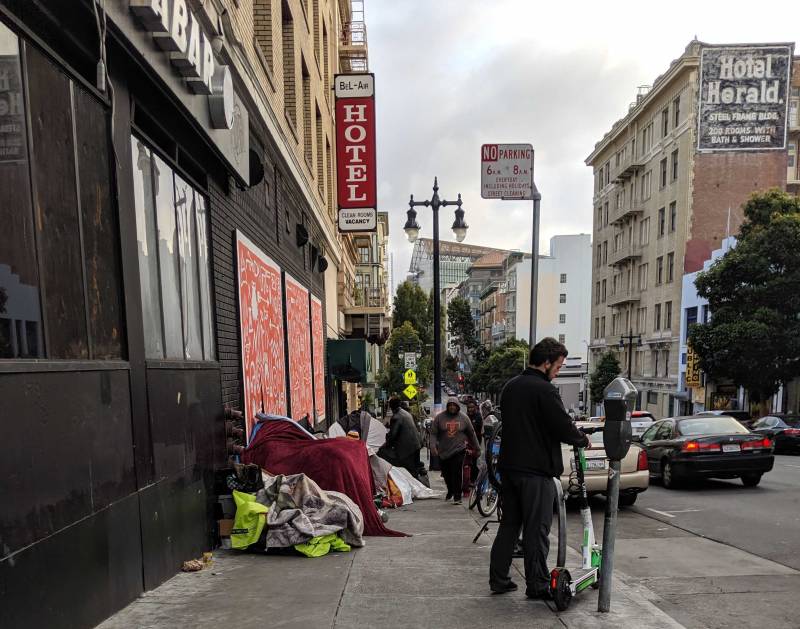“We are losing over two people a day to drug overdoses, mostly to fentanyl, and mostly in the Tenderloin and SoMa,” said Supervisor Matt Haney, who represents the district, in a statement on Friday. “This is a public health emergency demanding a crisis level response.”
The emergency declaration must be ratified by the Board of Supervisors within a week, and won’t take effect for longer than 90 days, according to the mayor’s office.
The move comes just days after Breed and Police Chief Bill Scott announced a new public safety strategy calling for a “tough love” approach to the Tenderloin, one that involves putting more police officers on the street, giving them greater access to real-time surveillance and generally being, in the mayor’s own words, “less tolerant of all the bulls— that has destroyed our city.”
Putting more police on the street will require more funding — a move that comes roughly a year and a half since Breed championed a plan to divert $120 million away from law enforcement. Increased patrols in the Tenderloin, Chief Scott said earlier this week, would also mean an end to ignoring public drug use.
In response to a string of organized mass shoplifting incidents in neighboring Union Square last month that drew national media attention — much to the consternation of city leaders — police have flooded the area, driving down thefts by some 80%, while racking up roughly 8,000 hours in officer overtime at a cost of more than $850,000, the department told KQED.
Asked if he supported a surge of police in his own district, Haney said public health services should take priority.
“I wasn’t here today to support an influx of cops,” he said after Breed’s announcement. “I was here today to support an influx of social workers and public health professionals and treatment facilities and confronting this deadly epidemic as the public health epidemic that it is.”
“I don’t believe in incarcerating people for being addicted to drugs,” Haney added. “If people feel like somebody who’s coming up to them to help them with their addiction has a pair of handcuffs and is also thinking about maybe locking them up in a cell, that person is not going to seek help.”
In making her case Friday, Breed hearkened back to the state of emergency she declared for the city at the onset of the COVID-19 pandemic, in February 2020. Breed said that move — which allowed San Francisco health officials to rapidly set up a COVID-19 command center, among other precautionary actions — was a major reason the city has one of the lowest COVID-19-related death rates in the country.
“We have to meet people where they are,” Breed said Friday. “We can’t wait for something to be set up. We can’t wait for something to go through a layered process. We have to move quickly.”
But among local community activists, reaction to Breed’s declaration has been mixed, at best.
Jennifer Friedenbach, executive director of the Coalition on Homelessness, slammed the mayor’s strategy.
“It’s really clear that Mayor Breed is vilifying and degrading people who are living in poverty,” she said, calling it a shortsighted political response to the “misleading flood of media hysteria around crime.”
“It’s clear that she’s going to be going after unhoused people. She’s going to be enforcing sit-lie laws. She’s going to go after substance users,” Friedenbach added. “What we believe is going to happen with this increase in police presence, it’s going to disproportionately impact Black and Brown unhoused community members who are, due to a lack of dignified housing options, forced to live out their private lives in public spaces.”
Pointing to Proposition C, the 2018 voter-approved measure that directs hundreds of millions of dollars a year to pay for services for unhoused people in the city, Friedenbach said Breed was already “sitting on very carefully crafted solutions to these issues that the community has been calling for, with feedback and expertise from unhoused community members themselves.”
Instead, she said, the mayor is relying on an overused tough-on-crime approach that will punish rather than help people most in need, and do little to address the root causes of the problem.
“There’s nothing new,” Friedenbach said of Breed’s strategy. “This is not changing course. This is literally doing a tried and failed policy that’s already failed.”

